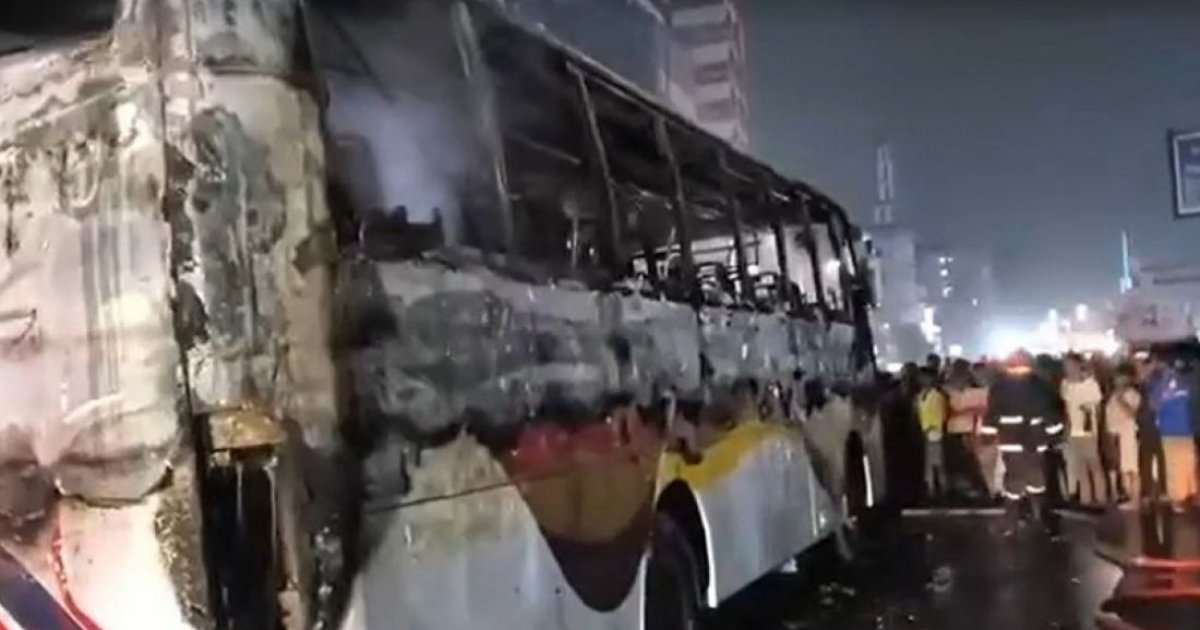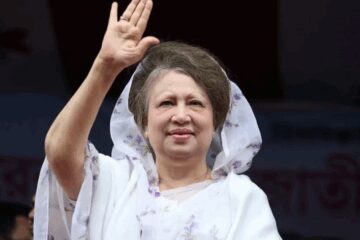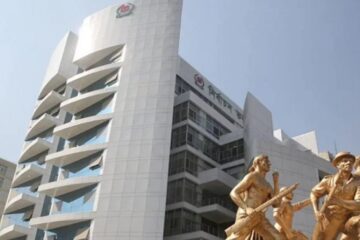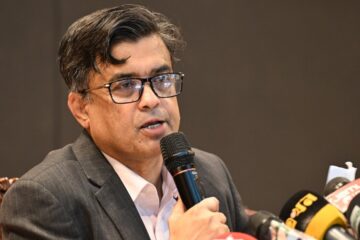In the past ten days, 195 leaders and activists of the banned Awami League have been arrested across Dhaka amid a wave of unrest, during which at least 20 vehicles were set on fire and multiple cocktail explosions were reported.
The violence follows the party’s announced “Dhaka lockdown” after the International Crimes Tribunal verdict against former prime minister Sheikh Hasina and two others.
Across the capital and other districts, a series of incidents involving cocktail explosions, vehicle arson, and flash marches by the banned Awami League and its affiliated organizations have been reported.
The banned Awami League announced a “Dhaka lockdown” program following the verdict in the case filed at the International Crimes Tribunal against former prime minister Sheikh Hasina and two others. Since then, unrest has spread throughout the capital, increasing public anxiety.
Law enforcement agencies, including the police, Rapid Action Battalion (RAB), the army, and the Border Guard Bangladesh (BGB) remain on high alert. Over the past four days, at least 20 vehicles have been set on fire and more than 50 cocktail explosions have been reported in Dhaka.
Meanwhile, over the past ten days, the Dhaka Metropolitan Police Detective Branch (DB) has arrested 195 leaders and activists of the banned Awami League and its allied organizations during operations across the capital.
Despite cocktail explosions and vehicle arson in recent days, Dhaka remained under tight security on Thursday.
Tensions around lockdown program
The Awami League announced the “Dhaka lockdown” program in response to the verdict in the International Crimes Tribunal case against Sheikh Hasina and two others. Security measures across the capital were heightened.
The Dhaka Metropolitan Police (DMP) stated that special security arrangements were in place in Dhaka on Thursday, preventing any untoward incidents.
The verdict in the case related to “crimes against humanity” involving former prime minister Sheikh Hasina and two others is scheduled for November 17 (Monday).
The Dhaka Metropolitan Police Detective Branch (DB) reported that, between November 3 and 12, they carried out operations across the capital and arrested 195 leaders and activists of the Awami League and its affiliates for alleged involvement in sabotage, cocktail explosions, and planning flash marches, particularly linked to November 13 (Thursday).
On November 12 (Wednesday), DB arrested 43 leaders and activists of the banned Awami League and affiliated organizations during operations across Dhaka.
These included the joint general secretary of Gajaria thana Awami League in Munshiganj, the secretary of religious affairs of the Central Krishak League, the vice-president of Dhaka Metropolitan North Awami League, and the president of the Women’s League.
DB stated that they were attempting to create unrest and public panic under the banner of the banned organization.
On November 11 (Tuesday), 44 leaders and activists were arrested for their involvement in flash marches, cocktail explosions, and funding.
On November 10 (Monday), 22 more were held, with evidence including voice recordings, chat histories, and mobile communications recovered by police.
On November 9 (Sunday), 34 individuals were arrested for planning flash marches and sabotage, with multiple cases filed against them in various police stations.
On November 3, seven leaders and activists from Barguna, Paltan, Ramna, Tangail, and other districts were arrested; they held positions at central and district levels of the Awami League.
On November 4, seven more, including former chairman Jannatul Ferdous Jhuma of Durgapur upazila in Netrokona, were arrested.
On November 5, four leaders in Dhaka were arrested on charges of planning sabotage.
On November 6, six more were arrested, including leaders of the Jubo League, Chhatra League, Matsyajibi League, and Union Awami League.
On November 7 (Friday), former Barisal upazila chairman, Habiganj Sramik League organizing secretary, and former Pallabi Awami League leader Abdus Salam Khokon were arrested.
On November 8 (Saturday), DB conducted operations across the capital and arrested 25 leaders and activists who were allegedly planning to create panic by releasing 100,000 gas balloons near the State Guest House Jamuna as part of the “Dhaka lockdown” program.
In total, over the past ten days, DB has arrested 195 leaders and activists accused of conducting the activities of the banned organization, sabotage, and creating public panic.
Fear from cocktail explosions and arson
Over the past week, at least 20 vehicles were set on fire and more than 50 cocktail explosions were reported across Dhaka and other parts of the country. Vehicle arson incidents occurred in Ashulia, Gazipur, Jatrabari, Sutrapur, Science Lab, Mirpur, and Uttara.
In the early hours of Wednesday, a bus of Alif Paribahan in Ashulia was completely burnt after being set on fire. On the same day, three buses were set ablaze in Gazipur’s Basan and Kashimpur police station areas.
On Tuesday night, a helper sleeping on a bus of Alam Paribahan in Fulbaria, Mymensingh, was burnt to death.
Earlier, on Monday morning, two buses were set on fire in Badda and Notun Bazar. Between Tuesday night and Wednesday morning, at least four vehicle arson incidents were reported.
Meanwhile, cocktail and hand grenade explosions have increased in Dhaka. On Tuesday night, two petrol bombs were thrown at Mohammadpur Preparatory School.
Additionally, at least 50 explosions occurred in Shahbagh, Dhanmondi, Mohammadpur, Mirpur, Farmgate, and Malibagh over the past five days.
DC (Media) of DMP, Muhammad Talebur Rahman, said: “From November 1 to 11, 27 cocktail explosions were reported at 15 locations in the capital. These are low-grade, locally made explosives similar to firecrackers. There is no need to panic, but we are identifying those responsible.”
He added: “The police are working at full capacity to prevent any sabotage. These operations are being conducted to ensure the safety of the people of Dhaka.”
Crime analysts have said that recent cocktail explosions, arson, and public violence are creating fear among ordinary citizens.
Dr Tawohidul Haque, a crime expert at Dhaka University, said: “As one side blames the other, criminals are taking advantage. Unless this culture of political blame is ended, violence will not stop.”
He also warned: “If law and order deteriorates, it could affect the election environment and pose major challenges to public participation.”
Analysts believe there is a risk of a repeat of pre-election violence similar to 2013. Political parties are urged to avoid violence and resolve issues through dialogue and compromise.
DC (Media) Muhammad Talebur Rahman reiterated that police remain vigilant against any sabotage, particularly to protect public safety. Several Chhatra League and Awami League leaders and activists have been arrested in connection with cocktail explosions and vehicle arson. Measures continue to ensure the highest level of security for the residents of Dhaka.



